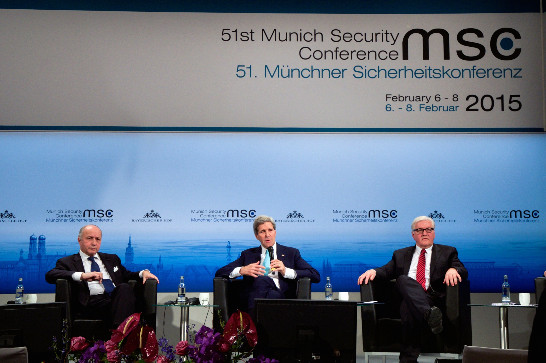 Fabius, Kerry, and Steinmeier at the Munich Security Conference of 2015.
Fabius, Kerry, and Steinmeier at the Munich Security Conference of 2015.
French Emphasize Climate Security
At this year’s Munich Security Conference, French Foreign Minister Laurent Fabius took the opportunity to stress the need to recognize climate change as a security issue.
The last challenge I will mention for our international security is the question of the climate. Why mention the climate? Not only because France will host at the end of this year the COP21, but also because I am convinced that the effects of climate disruption on global security are massive. It undermines development. It causes population displacement. It increases competition for natural resources. It weakens states and fuels conflicts. Climate disruption is not only an environmental issue; it is fundamentally a security issue.
Fabius strongly emphasized the need for global cooperation, asserting that there should be a “universal” agreement arising from COP21. Fabius also pointed out that as a global community we are already experiencing the effects of climate change, and must address the need for adaptation to minimize the security impact.
First, we need to reach a universal agreement, placing economies on the path to reduce carbon consumption and keeping the temperature rise below the two-degree limit. That is the whole point of the Paris Climate Conference in December. But the answer is also what is known as adaptation, meaning the provision of immediate assistance to populations whose daily life is impacted by climate disruption so that they are not forced to turn to despair and violence. We want adaptation to have a key place in the agreement we need to reach in Paris.
Fabius’ statement was consistent with France’s posture of seeing climate change as a core security concern, which was outlined in their 2013 White Paper on Defense and National Security.
The 2008 White Paper identified some natural, health and technological risks that are liable, owing to their scale, to disrupt our societies. Events since then have confirmed the reality of these risks…Certain climate change studies suggest that the scale or frequency of extreme events may increase and further weaken the regions that are already most vulnerable to them. The precise regional consequences of global warming over the next few decades are still very uncertain. However, the reduction in Arctic Sea ice already has strategic consequences and the prospect of regular use of new Arctic shipping lanes is drawing closer.
The foreign minister’s comments at the Munich Security Conference reiterated France’s position that climate change is a security issue which should be addressed by the international community, and discussed in the same manner as other security issues such as ISIS or the ongoing conflict in Ukraine. Climate change represents a serious security concern for all nations globally, and Fabius’ statements in Munich demonstrate a shift in the consideration of climate change from merely an environmental issue to a security one as well. As ASP has already noted, the U.S.’ latest National Security Strategy has also recognized the impact of climate change on security. Undoubtedly as climate change affects more and more nations we will continue to see climate security move to the fore of global issues in a security context.
Further Reading on ASP’s Climate Security work is below.
Climate Security Report:
Part One: Climate Change and Security
Part Two: Climate Change and Global Security
Part Three: Climate Change and the Homeland
The Global Security Defense Index on Climate Change
Ten Key Facts – Climate Change
Climate Change, The Arab Spring and Food Prices
Military Basing and Climate Change
American Security: The Impacts of Climate Change
Protecting the Homeland – The Rising Costs of Inaction on Climate Change






